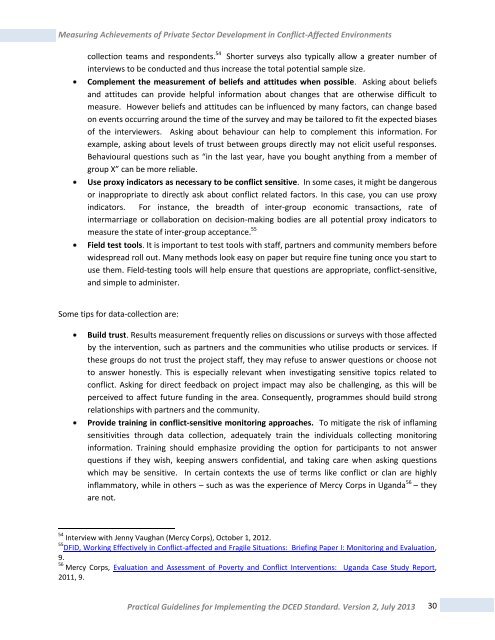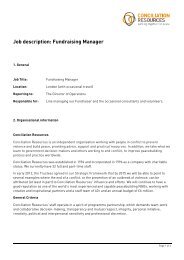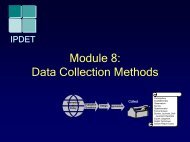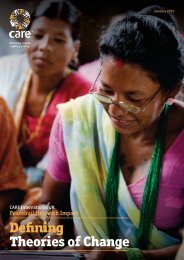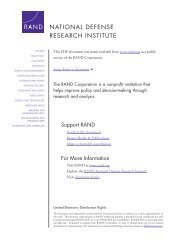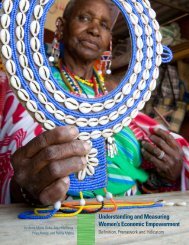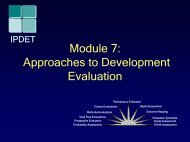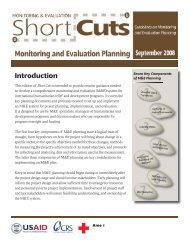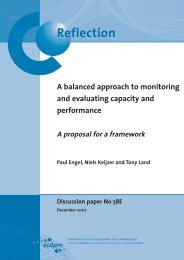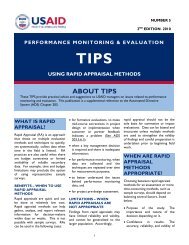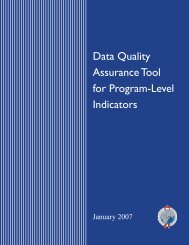Measuring Achievements of Private Sector Development in ... - DCED
Measuring Achievements of Private Sector Development in ... - DCED
Measuring Achievements of Private Sector Development in ... - DCED
You also want an ePaper? Increase the reach of your titles
YUMPU automatically turns print PDFs into web optimized ePapers that Google loves.
<strong>Measur<strong>in</strong>g</strong> <strong>Achievements</strong> <strong>of</strong> <strong>Private</strong> <strong>Sector</strong> <strong>Development</strong> <strong>in</strong> Conflict-Affected Environments<br />
collection teams and respondents. 54 Shorter surveys also typically allow a greater number <strong>of</strong><br />
<strong>in</strong>terviews to be conducted and thus <strong>in</strong>crease the total potential sample size.<br />
Complement the measurement <strong>of</strong> beliefs and attitudes when possible. Ask<strong>in</strong>g about beliefs<br />
and attitudes can provide helpful <strong>in</strong>formation about changes that are otherwise difficult to<br />
measure. However beliefs and attitudes can be <strong>in</strong>fluenced by many factors, can change based<br />
on events occurr<strong>in</strong>g around the time <strong>of</strong> the survey and may be tailored to fit the expected biases<br />
<strong>of</strong> the <strong>in</strong>terviewers. Ask<strong>in</strong>g about behaviour can help to complement this <strong>in</strong>formation. For<br />
example, ask<strong>in</strong>g about levels <strong>of</strong> trust between groups directly may not elicit useful responses.<br />
Behavioural questions such as “<strong>in</strong> the last year, have you bought anyth<strong>in</strong>g from a member <strong>of</strong><br />
group X” can be more reliable.<br />
Use proxy <strong>in</strong>dicators as necessary to be conflict sensitive. In some cases, it might be dangerous<br />
or <strong>in</strong>appropriate to directly ask about conflict related factors. In this case, you can use proxy<br />
<strong>in</strong>dicators. For <strong>in</strong>stance, the breadth <strong>of</strong> <strong>in</strong>ter-group economic transactions, rate <strong>of</strong><br />
<strong>in</strong>termarriage or collaboration on decision-mak<strong>in</strong>g bodies are all potential proxy <strong>in</strong>dicators to<br />
measure the state <strong>of</strong> <strong>in</strong>ter-group acceptance. 55<br />
Field test tools. It is important to test tools with staff, partners and community members before<br />
widespread roll out. Many methods look easy on paper but require f<strong>in</strong>e tun<strong>in</strong>g once you start to<br />
use them. Field-test<strong>in</strong>g tools will help ensure that questions are appropriate, conflict-sensitive,<br />
and simple to adm<strong>in</strong>ister.<br />
Some tips for data-collection are:<br />
Build trust. Results measurement frequently relies on discussions or surveys with those affected<br />
by the <strong>in</strong>tervention, such as partners and the communities who utilise products or services. If<br />
these groups do not trust the project staff, they may refuse to answer questions or choose not<br />
to answer honestly. This is especially relevant when <strong>in</strong>vestigat<strong>in</strong>g sensitive topics related to<br />
conflict. Ask<strong>in</strong>g for direct feedback on project impact may also be challeng<strong>in</strong>g, as this will be<br />
perceived to affect future fund<strong>in</strong>g <strong>in</strong> the area. Consequently, programmes should build strong<br />
relationships with partners and the community.<br />
Provide tra<strong>in</strong><strong>in</strong>g <strong>in</strong> conflict-sensitive monitor<strong>in</strong>g approaches. To mitigate the risk <strong>of</strong> <strong>in</strong>flam<strong>in</strong>g<br />
sensitivities through data collection, adequately tra<strong>in</strong> the <strong>in</strong>dividuals collect<strong>in</strong>g monitor<strong>in</strong>g<br />
<strong>in</strong>formation. Tra<strong>in</strong><strong>in</strong>g should emphasize provid<strong>in</strong>g the option for participants to not answer<br />
questions if they wish, keep<strong>in</strong>g answers confidential, and tak<strong>in</strong>g care when ask<strong>in</strong>g questions<br />
which may be sensitive. In certa<strong>in</strong> contexts the use <strong>of</strong> terms like conflict or clan are highly<br />
<strong>in</strong>flammatory, while <strong>in</strong> others – such as was the experience <strong>of</strong> Mercy Corps <strong>in</strong> Uganda 56 – they<br />
are not.<br />
54 Interview with Jenny Vaughan (Mercy Corps), October 1, 2012.<br />
55 DFID, Work<strong>in</strong>g Effectively <strong>in</strong> Conflict-affected and Fragile Situations: Brief<strong>in</strong>g Paper I: Monitor<strong>in</strong>g and Evaluation,<br />
9.<br />
56 Mercy Corps, Evaluation and Assessment <strong>of</strong> Poverty and Conflict Interventions: Uganda Case Study Report,<br />
2011, 9.<br />
Practical Guidel<strong>in</strong>es for Implement<strong>in</strong>g the <strong>DCED</strong> Standard. Version 2, July 2013<br />
30


